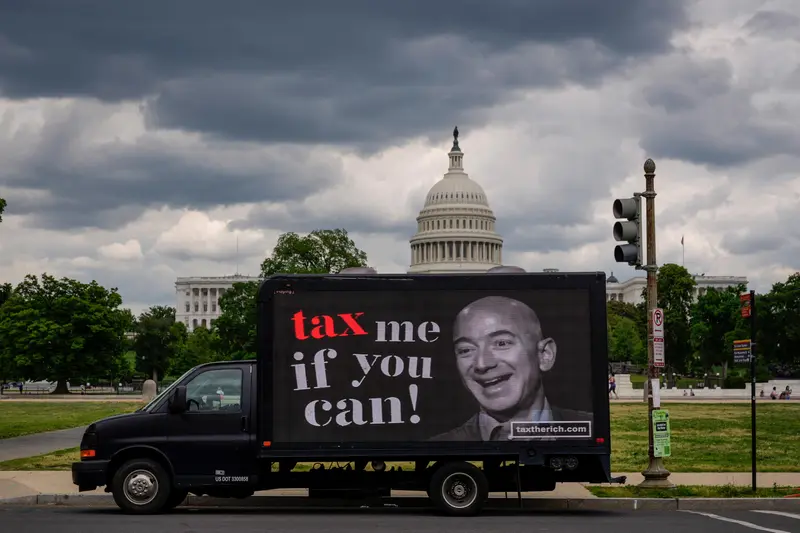ProPublica’s investigation released Tuesday revealing that the top 25 wealthiest Americans have paid little, and sometimes nothing, in federal income taxes has resulted in demands to rewrite the tax code and to investigate how the confidential data was released.
Congressional Democrats called for legislation to force the rich to pay more.
At a hearing Tuesday, Sen. Ron Wyden, D-Ore., chairman of the Senate finance committee, said “the country’s wealthiest, who profited immensely during the pandemic, have not been paying their fair share.” He said he was preparing proposed reforms but did not share details.
Sen. Elizabeth Warren, D-Mass., tweeted that ProPublica’s findings underscored the importance of instituting a wealth tax, a reform she has long pushed that would tax net worth, not just income like salaries and capital gains, which the wealthiest largely avoid paying. Sen. Bernie Sanders, I-Vt., said the story showed “the rich have money, the rich have power, the rich have lobbyists, and the rich do not pay their fair share of taxes.”
The White House echoed those concerns. “We know that there is more to be done to ensure that corporations, individuals who are at the highest income are paying more of their fair share,” Jen Psaki, the White House press secretary, said at a briefing.
At the same time, the White House, administration officials and members of Congress on both sides of the aisle expressed alarm over how the trove of confidential tax data was obtained by ProPublica.
IRS commissioner Charles Rettig said at a hearing Tuesday that “there is an investigation with respect to the allegations that the source of the information in that article came from the Internal Revenue Service.”
“The investigators will investigate,” he said.
A Treasury Department spokesperson told reporters “the unauthorized disclosure of confidential government information is illegal” and said the matter had been referred to the FBI, federal prosecutors in Washington, the Treasury’s inspector general and the IRS inspector general.
During a hearing Wednesday, Sen. Susan Collins, R-Maine, raised concerns about the leak with Attorney General Merrick Garland, saying “these highly confidential personal documents were obtained illegally.”
Collins seemed to compare the release of the tax data to abuses perpetrated during the Nixon administration. Garland responded, “I very well remember what President Nixon did in the Watergate period, the creation of enemies lists and the punishment of people through reviewing their tax returns.” He added that the leak was “an extremely serious matter.”
Garland said he knew nothing about the origin of the leak except what he had read in the ProPublica story, which he was “astonished” by. He said he expected the IRS would be referring the matter to the Justice Department. “This was on my list of things to raise after I finished preparing for this hearing,” he said. “I promise you it will be at the top of my list.”
Sen. Mike Crapo, R-Idaho, the top Republican on the finance committee, said during an earlier hearing that the leak raised questions about the White House’s proposals to crack down on tax avoidance by requiring banks and other financial institutions to share more financial data about individuals and companies with the IRS.
“We’re seeing information today that appears to be 15 years’ worth of leaked confidential individual tax data from the IRS,” he said.
Sen. Steve Daines, R-Mont., warned “this violation of individual privacy and confidentiality could easily happen to ordinary Americans and small businesses.”
Some commentators expressed concerns that the breach could chill the IRS’ willingness to continue sharing anonymized data with academics and other researchers.
The Wall Street Journal’s editorial board suggested the confidential data was released to support the Biden administration’s proposals to raise taxes: “The timing here is no coincidence, comrade.”
ProPublica does not know who the source of the information is, and it has not commented on when the data was obtained.
The revelations from the ongoing ProPublica investigation have already sparked a conversation about the fairness of the U.S. tax code, which largely favors people who own businesses or huge quantities of stocks and property over people who earn wages.
ProPublica found that the wealthiest can legally pay income taxes that are only a tiny fraction of the hundreds of millions, if not billions, of dollars by which their fortunes grow each year. The 25 richest Americans saw their worth rise a collective $401 billion from 2014 to 2018, for example, but paid only 3.4% of that growth in taxes.
Billionaires like Amazon’s Jeff Bezos, Tesla founder Elon Musk and financial titans Michael Bloomberg, Carl Icahn and George Soros had years in which they paid no federal income taxes at all. Each of them (with the exception of Bezos, whose representatives declined to receive ProPublica’s questions) said they paid all the taxes they owe.
Newspapers and cable stations across the country reported on ProPublica’s findings (an opinion article in The New York Times said the ProPublica article illuminates “how some of the wealthiest people in the United States essentially live under a different system of income taxation from the rest of us”), as did news outlets across the globe, including in Brazil, France and the Netherlands.
ProPublica will be reporting more stories based on the trove of tax data in the coming months.












